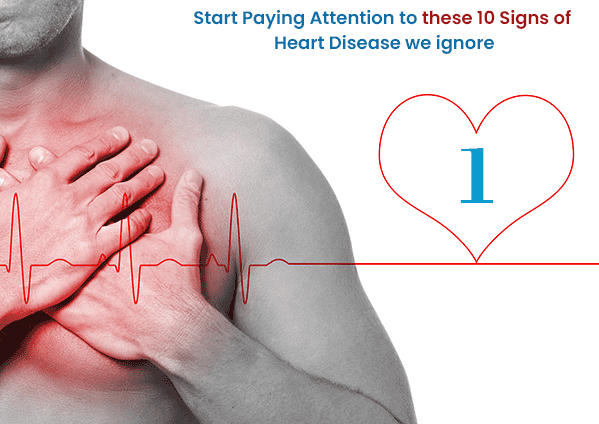Start Paying Attention to these 10 Signs of Heart Disease we ignore
SAAOL Heart Center / TNN / Updated: Feb 28, 2024

1. Chest Discomfort
It is the most common sign of heart disease, you may feel Chest pain, Tightness or Heaviness in your chest. Everyone has a different perception of chest pain. Some people say chest pain is like having a huge pain like Hamer put on their chest. Others say: chest pain- a compression, sometimes feeling like a burning in the chest. The discomfort usually lasts a few minutes. It can happen when you are resting or when you are doing physically Excretion. If it's just a very brief pain, or the spot hurts more when you touch or push on it, it's probably not a heart attack. Also, remember that you can have heart problems, even a heart attack, without having chest pain. That's especially common among women.
2. Nausea, Indigestion, Heartburn, or Stomach Pain:
Some people have these symptoms during a heart attack. They may even vomit. This symptom is more common in women than men. Of course, you can get a stomach ache(Epigastrium) for a variety of reasons that have nothing to do with your heart. The cause of those symptoms could be something that you ate. However, you still need to be aware that those symptoms can also be signs of heart disease.
3. Pain that Radiate to the Arm:
Another classic heart attack symptom is pain that radiates down the left side of the body. The pain seems to originate in the chest then spread outward; There are also some patients who only feel pain in the arm but when examined, it is known that it is a heart attack.
4. You Feel Dizzy or Light headache:
A lot of things can make you lose your balance or feel dizzy for a moment. It could be that you didn't eat enough, or you stood up too quickly. But if you suddenly feel off balance and experience chest pain or shortness of breath, call your doctor right away. That could mean your blood pressure has dropped because your heart can't pump the way it should.
5. Throat Choking or Jaw Pain
Sore throat or jaw pain is not usually heart related. Most likely, it's a muscle problem, a cold, or a sinus problem. But if you have pain or pressure in the center of your chest that spreads to your throat or jaw, it could be a sign of a heart attack.
6. You Get Exhausted Easily:
If you suddenly feel tired or short of breath after doing things that you used to do before and never had problems, make an appointment with your doctor right away. Excessive exhaustion or unexplained weakness, sometimes lasting for days, can be a sign of heart disease, especially for women.
7. Snoring:
It’s normal to snore a little while you snooze. But unusually loud snoring that sounds like a gasping or choking can be a sign of sleep apnea. That’s when you stop breathing for brief moments several times at night while you are still sleeping. This puts extra stress on your heart.
8. A Cough That Won’t Quit
In most cases, this is not a sign of heart disease. But if you have heart disease or know you're at risk, pay special attention to this possibility. If you have a persistent cough that produces white or pink mucus, it could be a sign of heart failure. This happens when the heart can't keep up with the body's needs, causing blood to leak back into the lungs. Ask your doctor to check your cough.
9. Your legs, feet and ankles are swollen
This could be a sign that your heart is not pumping blood as efficiently as it should. When the heart can't pump fast enough, blood backs up in the veins and causes swelling. Heart failure can also make it difficult for the kidneys to remove water and sodium from the body, which can lead to swelling.
10. Irregular heartbeat
it’s normal if your heart beats fast when you're nervous or excited, holding your breath, or adding a beat at a time for a short period of time. But if you feel your heart beat faster by just a few seconds or if it happens often, tell your doctor. https://www.vinmec.com/en/cardiology/health-news/11-signs-of-heart-disease-youre-easy-to-ignore/
 India
India